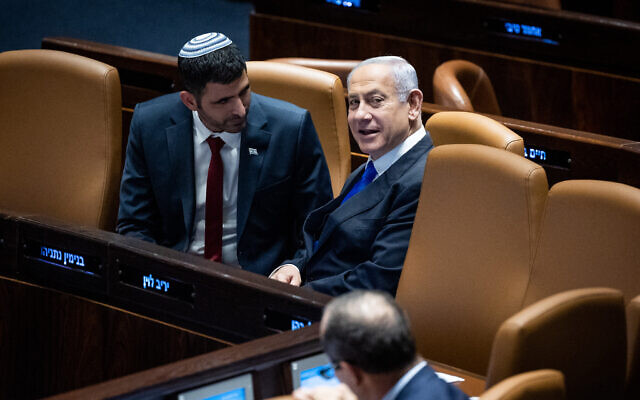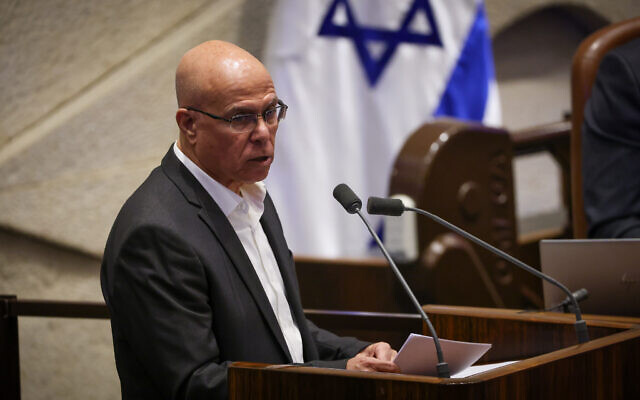Communications Minister Shlomo Karhi, who spearheaded the effort to pass the law, vowed immediately after the final vote that the Qatari-funded Al Jazeera news channel would be closed down “in the coming days,” saying “there won’t be freedom of expression for Hamas mouthpieces in Israel.”
Karhi, a member of the hardline flank of Prime Minister Benjamin Netanyahu’s Likud party, continued: “We have brought to fruition an effective and swift tool against those who use freedom of the press to harm Israel’s security and IDF soldiers, and who incite to terrorism during a time of war.”
The US expressed concern over the legislation, with White House Press Secretary Karine Jean-Pierre saying: “We believe in the freedom of the press. It is critically important. The United States supports the critically important work journalists around the world do, and that includes those who are reporting on the conflict in Gaza. If those reports are true, it is concerning to us.”
In an earlier statement, Netanyahu’s Likud party said that the prime minister would “act immediately to close Al Jazeera” in accordance with the terms of the new law.
The new law gives the prime minister and the communications minister the authority to order the temporary closure of foreign networks operating in Israel and confiscate their equipment if it is believed that they are “doing actual harm to state security.”

It is the communications minister who is empowered to issue such orders, but only after receiving the approval of the prime minister and the security cabinet, and after a professional position paper has been presented to the prime minister and the communications minister by the security services detailing the “factual foundations” of allegations that the channel is causing damage to Israel’s national security.
The law empowers the communication’s minister to order “content providers” to cease broadcasting the channel in question; order the channel’s Israeli offices to be shuttered; order the channel’s equipment be confiscated; and order the channel’s website to be taken offline, if the server is physically located in Israel, or otherwise block access to the website.
Such orders are valid for 45 days but can be renewed for further 45-day periods.
Under the terms of the law, any order to shut down a foreign news channel must be brought within 24 hours for judicial review by the president of a district court, who must then decide within three days if they wish to change or shorten the period of the order.
The law itself has been passed as a temporary law and will expire on July 31 or earlier if the declaration of an emergency situation is lifted by the government.
The legislation passed a first reading in the plenum in February and was approved for its second and third readings following an extended debate in the Knesset National Security Committee.

Though Israeli officials have long complained aboçut Al Jazeera’s coverage, which they say is heavily influenced by Hamas and endangers IDF troops in Gaza, in the past they stopped short of taking action, mindful of Qatar’s bankrolling of Palestinian construction projects in the Gaza Strip, which were seen by all sides as a means of staving off conflict.
Communications Minister Karhi’s office said in October that the drive to shut down Al Jazeera in Israel was based on “proof that it is assisting the enemy, broadcasting propaganda in the service of Hamas, in Arabic and English, to viewers around the world, and even passing sensitive information to the enemy.”
Karhi accused the station of pro-Hamas incitement and exposing Israeli troops to ambushes. Al Jazeera and the Doha government did not respond to those allegations.
In November, however, Israel appeared to spare the Qatari station, instead ordering the shutting down of the local broadcasts of a smaller Lebanese pro-Iranian channel, Al Mayadeen, under emergency media regulations.
Since the war erupted on October 7 with Hamas’s unprecedented attack — in which terrorists murdered some 1,200 people, mostly civilians, and kidnapped 253 — Doha has mediated ceasefire talks under which Israel recovered 105 hostages in November.
Negotiations on a second proposed truce that would see the release of additional hostages have yet to bear fruit. In January, Netanyahu publicly called for the Qataris to apply more pressure on Hamas. Qatar hosts the terrorist organization’s political office and several top Hamas officials.










